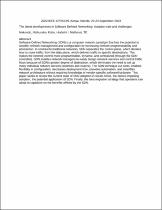 ResearchSpace
ResearchSpace
The latest developments in Software Defined Networking: Adoption rate and challenges
JavaScript is disabled for your browser. Some features of this site may not work without it.
- ResearchSpace
- →
- Research Publications/Outputs
- →
- Conference Publications
- →
- View Item
| dc.contributor.author |
Makondo, Ntshuxeko

|
|
| dc.contributor.author |
Kobo, Hlabishi I

|
|
| dc.contributor.author |
Mathonsi, TE

|
|
| dc.date.accessioned | 2024-01-11T10:30:47Z | |
| dc.date.available | 2024-01-11T10:30:47Z | |
| dc.date.issued | 2023-09 | |
| dc.identifier.citation | Makondo, N., Kobo, H.I. & Mathonsi, T. 2023. The latest developments in Software Defined Networking: Adoption rate and challenges. http://hdl.handle.net/10204/13508 . | en_ZA |
| dc.identifier.isbn | 979-8-3503-3621-4 | |
| dc.identifier.isbn | 979-8-3503-3622-1 | |
| dc.identifier.uri | DOI: 10.1109/AFRICON55910.2023.10293567 | |
| dc.identifier.uri | http://hdl.handle.net/10204/13508 | |
| dc.description.abstract | Software Defined Networking (SDN) is a computer network paradigm that has the potential to simplify network management and configuration by increasing network programmability and abstraction. In contrast to traditional networks, SDN separates the control plane, which decides how to route traffic, from the data plane, which delivers traffic to specific destinations. This makes the network control more programmable, dynamic, and centralized (through the SDN controller). SDN enables network managers to easily design network services and control traffic flows because of SDN's greater degree of abstraction, which eliminates the need to set up many individual network devices (switches and routers). The SDN technique cut costs, enables flexibility in configuration, decreases deployment time, provides automation, and simplifies network architecture without requiring knowledge of vendor-specific software/hardware. This paper seeks to review the current state of SDN adoption in South Africa, the factors impeding adoption, the potential application of SDN. Finally, the best migration strategy that operators can adopt to capitalize on the benefits offered by the SDN. | en_US |
| dc.format | Abstract | en_US |
| dc.language.iso | en | en_US |
| dc.relation.uri | https://ieeexplore.ieee.org/document/10293567 | en_US |
| dc.source | 2023 IEEE AFRICON, Kenya, Nairobi, 20-23 September 2023 | en_US |
| dc.subject | Control plane | en_US |
| dc.subject | Data plane | en_US |
| dc.subject | Software Defined Networking | en_US |
| dc.subject | SDN | en_US |
| dc.subject | Software-Defined Wide Area Network | en_US |
| dc.subject | SD-WAN | en_US |
| dc.title | The latest developments in Software Defined Networking: Adoption rate and challenges | en_US |
| dc.type | Conference Presentation | en_US |
| dc.description.pages | 6 | en_US |
| dc.description.note | ©2023 IEEE. Due to copyright restrictions, the attached PDF file only contains the abstract of the full text item. For access to the full text item, please consult the publisher's website: https://ieeexplore.ieee.org/document/10293567 | en_US |
| dc.description.cluster | Next Generation Enterprises & Institutions | en_US |
| dc.description.impactarea | Cloud Network Architectures | en_US |
| dc.identifier.apacitation | Makondo, N., Kobo, H. I., & Mathonsi, T. (2023). The latest developments in Software Defined Networking: Adoption rate and challenges. http://hdl.handle.net/10204/13508 | en_ZA |
| dc.identifier.chicagocitation | Makondo, Ntshuxeko, Hlabishi I Kobo, and TE Mathonsi. "The latest developments in Software Defined Networking: Adoption rate and challenges." <i>2023 IEEE AFRICON, Kenya, Nairobi, 20-23 September 2023</i> (2023): http://hdl.handle.net/10204/13508 | en_ZA |
| dc.identifier.vancouvercitation | Makondo N, Kobo HI, Mathonsi T, The latest developments in Software Defined Networking: Adoption rate and challenges; 2023. http://hdl.handle.net/10204/13508 . | en_ZA |
| dc.identifier.ris | TY - Conference Presentation AU - Makondo, Ntshuxeko AU - Kobo, Hlabishi I AU - Mathonsi, TE AB - Software Defined Networking (SDN) is a computer network paradigm that has the potential to simplify network management and configuration by increasing network programmability and abstraction. In contrast to traditional networks, SDN separates the control plane, which decides how to route traffic, from the data plane, which delivers traffic to specific destinations. This makes the network control more programmable, dynamic, and centralized (through the SDN controller). SDN enables network managers to easily design network services and control traffic flows because of SDN's greater degree of abstraction, which eliminates the need to set up many individual network devices (switches and routers). The SDN technique cut costs, enables flexibility in configuration, decreases deployment time, provides automation, and simplifies network architecture without requiring knowledge of vendor-specific software/hardware. This paper seeks to review the current state of SDN adoption in South Africa, the factors impeding adoption, the potential application of SDN. Finally, the best migration strategy that operators can adopt to capitalize on the benefits offered by the SDN. DA - 2023-09 DB - ResearchSpace DP - CSIR J1 - 2023 IEEE AFRICON, Kenya, Nairobi, 20-23 September 2023 KW - Control plane KW - Data plane KW - Software Defined Networking KW - SDN KW - Software-Defined Wide Area Network KW - SD-WAN LK - https://researchspace.csir.co.za PY - 2023 SM - 979-8-3503-3621-4 SM - 979-8-3503-3622-1 T1 - The latest developments in Software Defined Networking: Adoption rate and challenges TI - The latest developments in Software Defined Networking: Adoption rate and challenges UR - http://hdl.handle.net/10204/13508 ER - | en_ZA |
| dc.identifier.worklist | 27287 | en_US |





